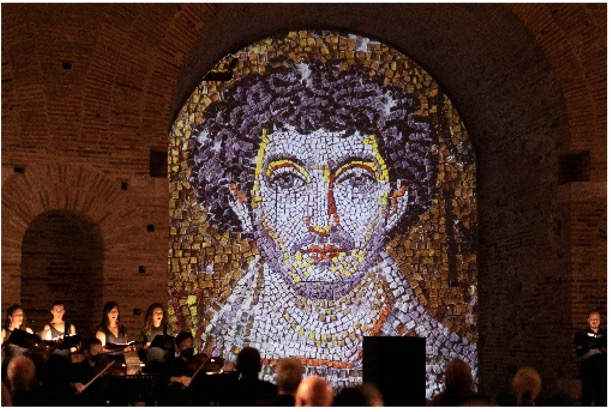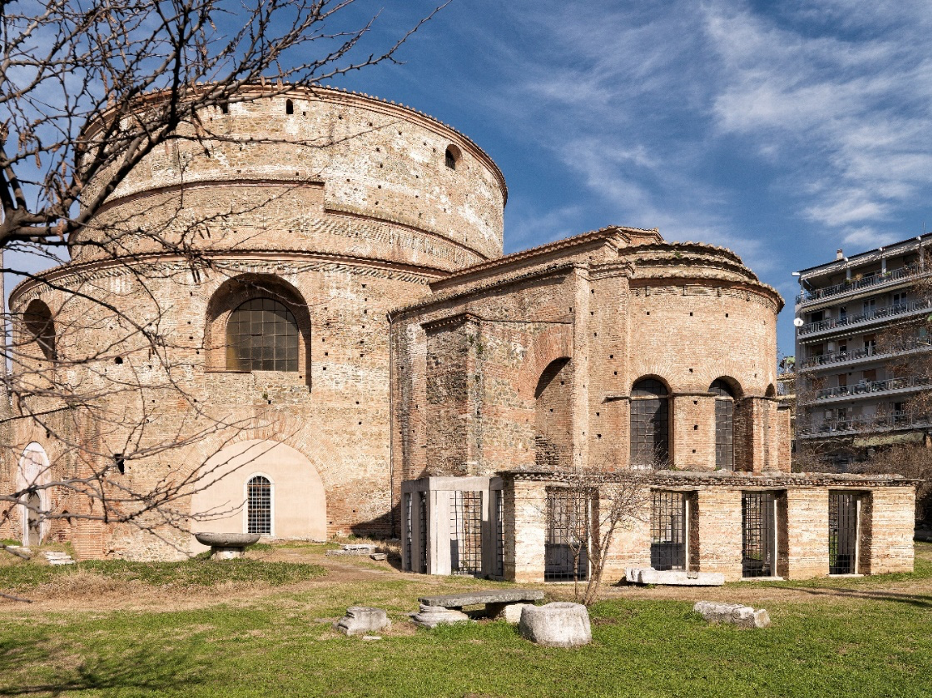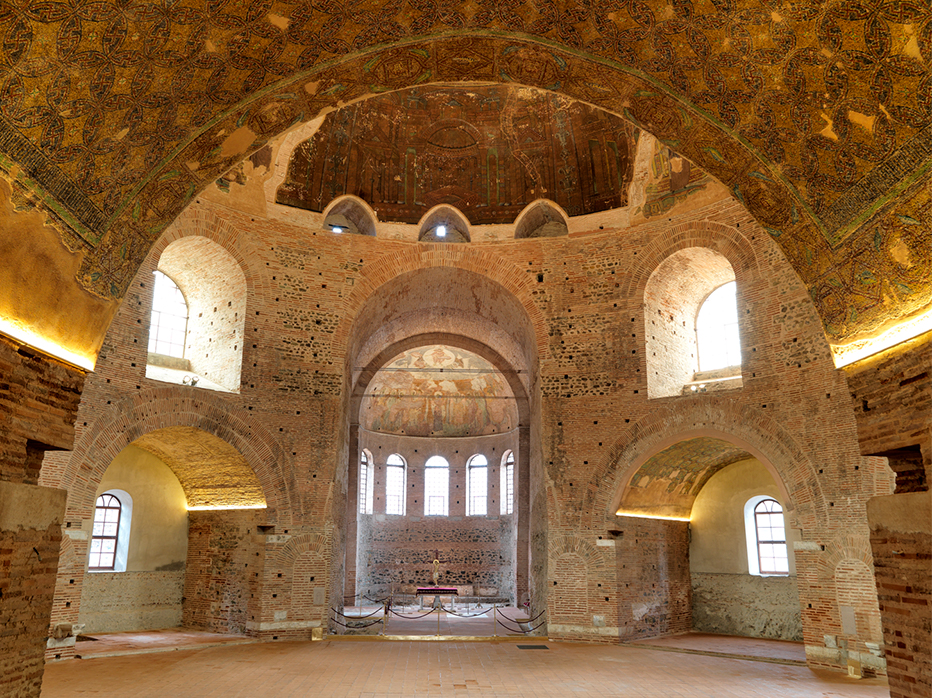For two days, the heart of Europe will beat in Thessaloniki

Leading figures from politics, diplomacy, justice, science and culture are arriving in Thessaloniki next week for this year’s Empress Theophano Prize, which will be awarded to the scientist couple who developed the first vaccine against the coronavirus, Dr Uğur Şahin and Dr Özlem Türeci, in a magnificent Award Ceremony that will be held on Wednesday, October 13, 2021 in Thessaloniki, inside the emblematic Rotunda monument, in the presence of HE the President of the Hellenic Republic, Katerina Sakellaropoulou.
This year’s Prize will bring to Thessaloniki for the first time almost every member of the Advisory and Governing Council of the Foundation, from across Europe. Among them, visiting Greece and Thessaloniki to honour the Award Ceremony with their presence are Mary McAleese, former President of Ireland, Tarja Halonen, former President of Finland, Rita Süssmuth, former President of the Bundestag of Germany, Sir Ivan Rogers, former UK Ambassador to the EU, and Maria Luisa Poncela, Former Secretary of State for Trade and Secretary General for Science and Innovation of Spain.
Just a few days before visiting Thessaloniki for the Empress Theophano Award Ceremony, Dr Uğur Şahin and Dr Özlem Türeci stated that “The Empress Theophano Prize is a great recognition and an honour for us. Thank you for deeming us worthy ambassadors of the cause that this Prize represents: Improving lives is indeed the most noble purpose of science, and a mission which is close to our hearts. We are thrilled to accept this prestigious award and do this on behalf of an extraordinary team that made Project Lightspeed – Made in Europe possible.”
From his side, the President of the Advisory Council, Herman Van Rompuy, President Emeritus of the European Council and former Minister of State of Belgium, spoke about the award and this year’s winners: “We honour the two winners and through them all those who work for good of their fellow human beings. After all, generosity and solidarity were born through the pandemic. [….] They were forced to walk on unknown paths for the good of humanity. They are companions in life, but also in research. At the same time, with this award, we honour the entire team that worked with them for this purpose. We were happy and surprised to find out afterwards that, while they now live and work in Germany, the ancestors of these scientists are from this region of Europe – Thessaloniki.“
Mary McAleese, former President of Ireland, referring to this year’s award, states that “Theophano Foundation honours the remarkable husband-and-wife team whose development of the mRNA vaccine has allowed us to hope again, breathe again, live again. If ever we needed proof of the miracles science can perform, they are it. If ever we needed reassurance that our future wellbeing, the future wellbeing of all humanity has stewards and champions of profound goodness allied to quiet hard-working genius, they are it.”
Tarja Halonen, former President of Finland, draws links between the circumstances of the pandemic and the aims of the prize itself, noting: “The current moment has been marked with growing divisions within and outside Europe. The COVID-19 pandemic has not only affected our health and well-being, but it can also have far-reaching implications for social cohesion. Diversity should be seen as a richness upon which we can build a diverse and inclusive Europe. Improving mutual understanding of Europe’s historic roots and fostering cooperation through Theophano Prize are important goals and I am happy to give my contribution.”
Finally, Michel Praet, Vice-President of the Museum of European History, considers this year’s award, which focuses on the key position of science in society, in relation to that of the previous year on Education and the ERASMUS student exchange programme: “Education and science are branches of the same tree. A tree the trunk of which is made of research, knowledge, art and culture. A tree the roots of which are curiosity, serendipity, desire and wonder. A tree growing in force and beauty, pursuing wisdom. A Theophano tree that helps Europe, thanks to the vigour of transmission, to flourish and to enlighten the world.”
The Award Ceremony of this year’s Empress Theophano Prize will take place on Wednesday the 13th of October in the emblematic Rotunda monument, in the presence of HE the President of the Hellenic Republic Katerina Sakellaropoulou. In addition, the next day, Thursday the 14th of October at 17:00 at the Thessaloniki Concert Hall (M2 – Riadis Hall), there will be a Round Table Discussion around the topic “Securing Future Wellbeing Through Science” – an international discussion panel on critical issues regarding the future of Europe. With the participation of the two prize recipients and selected members of the Advisory Committee, topics related to science for the Common Good, science and innovation in Europe, science and competitiveness, science and education, and science and healthy living will be discussed.
EVENT VIDEO
President of the Advisory Council of Theophano Foundation, Herman Van Rompuy
The Award Ceremony and the Round Table are sponsored by:

Official air carrier sponsor:

With the kind support of:

INFORMATION: Vicky Papadimitriou, Project Coordination | E: info@theophano.eu | T: +30 6937 229858
THE 2020 EMPRESS THEOPHANO PRIZE AT A GLIMSE
A short video that conveys the rationale for the Prize and the atmosphere of the ceremony:




The Advisory Council
Chairman
Herman Van Rompuy
President Emeritus of the European Council
Former Minister of State of Belgium (BE)
Members
Mary McAleese
Former President of Ireland | Professor of Children, Religion and Law, University Glasgow (IRL)
Leonie Bell
Trustee Edinburgh International Festival | Director Victoria & Albert Museum Dundee (UK)
Nikiforos Diamandouros
Former European Ombudsman (GR)
Élisabeth Guigou
President, Anna Lindh Foundation | Former Secretary of State (F)
Tarja Halonen
Former President of Finland (FI)
Agnieszka Holland
Author and film director (PL)
Maria Luisa Poncela
Former Secretary of State (ES)
Michel Praet
Vice-President Museum of European History (BE)
Georges Prevelakis
Professor Emeritus, Paris-Sorbonne University (FR)
Sir Ivan Rogers
Former UK Ambassador to the EU (UK)
Chiara Saraceno
Honorary fellow Collegio Alberto, University of Turin (IT)
Vassilios Skouris
Former President, European Court of Justice of the EU (GR)
Karl Prince zu Schwarzenberg
Former Minister of Foreign Affairs (CZ)
Rita Süssmuth
Former President of the German Parliament (DE)
Panos Tzonos
Professor Emeritus, Aristotle University of Thessaloniki (GR)
Luuk Van Middelaar
Professor of EU Foundations and Institutions, University of Leiden (NL)
The Governing Council
Chairman
Stavros Andreadis
Chairman, SANI/IKOS Group
Chairman, Cultural Society of Entrepreneurs of Northern Greece (GR)
Members
Nikolaos Efthymiadis
Chairman, EFTHYMIADIS Agrotechnology Group
Honorary Chairman, Federation of Greek Industries (GR)
Evangelos Gerovassiliou
Chairman, Gerovassiliou Wines (GR)
Constantinos Gleoudis
Chairman, KAVEX
Member of the Board, Hellenic Society for the Environment and Cultural Heritage (GR)
Theodoros Ikonomou
Chairman, Greek Forest Property Association
Head of a forest management and wood production firm (GR)
Nada Korac Kakabadse
Professor of Policy, Governance and Ethics, Henley Business School, University of Reading (UK)
George Mylonas
Chairman, ALUMIL Group (GR)
Sonja Puntscher-Riekmann
Professor Emeritus of Political Theory and European Politics, University of Salzburg (AT)
Stefan Schepers
Secretary General, High Level Groups on Policy Innovation (BE)
Vassos Konstantinidis
Chairman, INART (GR)
Empress Theophano
Empress Theophano, who inspired this prize, is a historic figure of Europe who played a significant role in its development during the 10th century.
The niece of Emperor John I Tzimiskes, she married Otto II and was crowned Holy Roman Empress as his wife. Following his death, she maintained the title of Empress. Her historic presence in Western Europe, dedicated to improving relations between East and West, offered a positive contribution to the cultural renaissance of western European territories, introducing to the west the central role women had in Byzantine society and transferring significant influence from the flourishing Byzantine empire in the fields of education, the arts, commerce, and health, while working to advance civil governance, promoting it over the military.
Empress Theophano is buried at the Cathedral of St Pantaleon in Cologne, Germany.
The Rotunda Monument
The emblematic monument of Thessaloniki, was constructed in the early 4th century AD, on the turning point between the pagan with the Christian world, probably as a temple for ancient cult worship or as a mausoleum for Constantine the Great (306-337). This circular, domed building measures 29.80 meters in height, 24.50 meters in diameter, its walls are 6.30 meters thick and can only be compared architecturally to the Pantheon in Rome. Not long after it was built and during the early years of the long-lived Byzantine Empire (330-1453), the Rotunda was turned into a Christian church with the addition of a sanctuary on its eastern side. The interior was decorated with Early Byzantine (4th- 6th c. AD) wall mosaics of unique artistry and beauty. It was Thessaloniki’s cathedral church (metropolis) between 1524 and 1591, the year in which it was converted to a mosque by the Ottoman conquerors. It remained in use as a mosque until the city’s liberation in 1912. Its dedication since that time to Saint George (Agios Georgios) is owing to the small neighboring church of this name. The mosaic decoration of the Rotunda is a masterpiece of Late Antique art.
Text source: http://galeriuspalace.culture.gr/en/monuments/rotonta/

Photo credits: Ephorate of Antiquities of Thessaloniki City.

Photo credits: Studio 8 Photos, Efi Panagoula.
